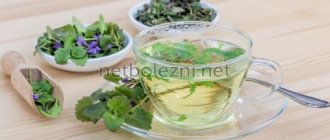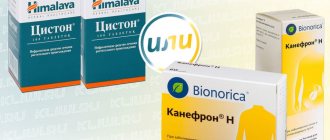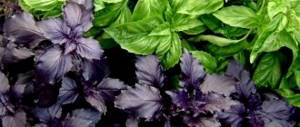Manufacturer: SOiK
Active ingredients
- Not indicated. See instructions
Pharmacological action
- Not indicated. See instructions
- Description of the pharmacological action Herbal tea "Nefron"
- Composition of herbal tea "Nefron"
- Indications for use of the drug Herbal tea "Nefron"
- Release form of the drug Herbal tea "Nefron"
- Contraindications to the use of the drug Herbal tea "Nefron"
- Method of administration and dosage of the drug Herbal tea "Nefron"
- Precautions when taking the drug Nephron Herbal Tea
- Storage conditions for the drug Herbal tea "Nefron"
- Shelf life of the drug Herbal tea "Nefron"
Compound
Most medicinal mixtures consist of diuretic herbs (cat's whisker, lingonberry and bearberry leaves), antimicrobial and anti-inflammatory ingredients. Real kidney tea is called orthosiphon stamen and its leaves or cat's whisker - a mild plant diuretic from the Lamiaceae family.
The herb is used according to indications:
chronic and acute inflammation of the kidneys; urethritis; cystitis; urolithiasis disease; edema associated with cardiovascular pathologies, hypertension; swelling in pregnant women.
Orthosiphon helps normalize urodynamics, improving glomerular filtration and tubular functioning; promotes the removal of excess salts and the dissolution of urate and oxalate stones due to alkalization of urine; the separation of fluid in the body doubles, flushing the kidneys and urinary tract.
Orthosiphon staminate
The antispastic effect of the plant is used to relieve pain in renal colic. The monocomponent herbal medicine Orthosiphon is produced based on cat's whiskers.
You can get other ready-made kidney preparations at the pharmacy:
Urophyton: bearberry, birch, plantain leaves, horsetail and St. John's wort herbs, calendula flowers, licorice root. Herbal tea acts as a diuretic uroseptic, promotes the dissolution of sand, and destroys fungal infections in the urinary tract. Taking Urophyton relieves swelling, reduces allergic manifestations, and has a sedative effect. Phytonephrol is a urological collection of bearberry and peppermint leaves, marigold inflorescences, dill seeds, and Eleutherococcus roots. It is used in the complex treatment of nephropathologies and urological diseases as an antiseptic, antispasmodic and diuretic. Nephron is a kidney tea with uroseptic and diuretic effects, normalizes water-salt metabolism. The medicine contains: lingonberry leaves, St. John's wort, knotweed, goldenrod, calendula, nettle, peppermint, horsetail, corn silk, calamus root, hop cones.
Treatment and prevention of prostatitis
Before using herbs, you need to clarify: the names and properties of the plants that are present in the collection, the treatment regimen and possible dosage. The general rules for preparing tea are as follows: you need to pour boiling water over the container for brewing herbs, pour a glass of boiling water into the required amount of the composition. Leave for about 5-10 minutes, without covering anything on top. Freshly brewed tea is the most beneficial.
If necessary, you can prepare a medicinal drink for the day, for example, in a thermos. To prepare the infusion, pour 30 g of the medicinal mixture into a thermos with 500 ml of very hot water. After 1.6-2 hours, filter the infusion. Drink 60 ml of warm drink 4-5 times a day.
To prepare the decoction, 14-30 g of dried herbal composition is poured with boiling water and simmered for about 10 minutes in a water bath. After 15-20 minutes, filter. Take in small portions throughout the day.
The treatment course lasts an average of three weeks. After 10 days, treatment can be repeated. Then you should apply another herbal mixture.
For chronic diseases, herbal preparations for the kidneys, brewed as tea, are used for a long time, about six months. But the result will be in the form of a stable healing state of the whole organism.
How to reduce blood pressure with hypertension using medicinal herbs?
age under 12 years; serious disorders of the kidneys and genitourinary system; period of childbearing and breastfeeding; allergy; oncological diseases; acute viral and infectious diseases, etc.
It is difficult to imagine treating an inflamed bladder without the use of herbal infusions.
How kidney tea works
Kidney tea for cystitis has a complex effect: eliminates stagnation of urine, flushes out infection from the bladder and urethra, prevents the proliferation of pathogenic microbes and their migration towards the kidneys.
For cystitis, you can drink any herbal infusion with a diuretic and antiseptic effect; tea for the kidneys based on lingonberry and bearberry leaves is especially useful.
Monastic gathering of Father George
In folk medicine, kidney herbal preparations are widely used to treat diseases of the genitourinary system, namely:
- Cystitis;
- Urolithiasis;
- Pyelonephritis;
- Nephroptosis;
- Glomerulonephritis;
- Hydronephrosis;
- Urethritis;
- Kidney failure;
- Kidney cancer.
It can also be used to relieve swelling, remove stones and sand from the kidneys and treat inflammatory processes in the urinary system. The natural composition of such preparations strengthens the immune system and improves the functioning of many internal organs.
The collection is indispensable for cystitis - inflammation of the bladder, which is less common, but still affects males. The medicine is also used as an adjuvant for pyelonephritis, an inflammatory process in the kidneys.
An infusion from filter bags is prepared as follows: pour 100 ml of boiling water into two bags, cover, and allow to cool at room temperature for half an hour. Then add another half a glass of boiled water to the resulting infusion and drink in small sips.
Treatment is carried out for two to four weeks three times a day. It is best to take the medicine 20-25 minutes before the main meal. At the end of the course, take a ten-day break and, if necessary, repeat the treatment.
If the disease is chronic, prevention of its relapse is carried out once a month in the autumn-winter period, in the summer and spring once every three months. The exact treatment regimen will be determined by the attending urologist, who is registered with the patient suffering from these diseases.
It is prohibited to deviate from the treatment regimen prescribed by the doctor, as this can lead to addiction and increased inflammation in the organs of the genitourinary system.
A urological collection is prescribed for prostatitis of any form, as well as to prevent its development in men over forty years of age. In addition to Phytonephrol, kidney herbs are popular, which include “male” herbs: motherwort, yarrow, stinging nettle. Birch buds and lingonberry leaves are good for the male genitourinary system.
If a ready-made collection of these plants is not available in the pharmacy, you can make it yourself by combining the plants in equal proportions. Next, one part of the collection is poured with twenty parts of boiling water and left for 30 minutes.
Take two tablespoons of infusion half an hour before meals 3 times a day. As medical practice shows, the minimum course of treatment with this collection is two weeks.
A collection based on lingonberry leaves is used to treat both acute prostatitis and to alleviate the patient’s condition in the chronic form of the disease. All of these components complement and enhance each other’s action, due to which such a collection has the following effect:
- eliminates inflammation in the prostate gland;
- increases urine outflow;
- increases the patient's immunity;
- fights pathogenic microflora;
- normalizes the psycho-emotional state of the patient.
DETAILS: Diseases of the foreskin in boys - questions and answers. — Child from one to three years old
This complex action helps relieve the main manifestations of prostatitis, improve the condition of the prostate gland, and prevent the development of complications of the disease. Also, the positive effect of herbs intended for the treatment of prostatitis will be felt by the gallbladder, kidneys and other organs of the reproductive system.
The main complication of pyelonephritis is urolithiasis. This disease is very dangerous because the movement of stones can lead to blockage of the ureters and kidney failure, which can be fatal for the patient.
There are two ways to remove kidney stones: through surgery or by crushing them with special preparations. The latter is possible thanks to the urological collection, which includes dill (seeds), hops (cones), blueberries (leaves), chicory and burdock (root).
All components are mixed in equal quantities, after 2 tbsp. spoons of the resulting mixture are poured with half a liter of boiling water and left for 12 hours. Take 2 tbsp infusion. spoons 4 times a day. The treatment is long-term, at least two months, after which you should take a break for two weeks and repeat the therapy again.
The active components of herbs and plants help crush large stones into sand, and the diuretic effect of the collection will ensure the removal of this sand from the body. The body's defenses, vitality, and overall health will also increase.
But all these fees should be taken only after consultation with your doctor. Only a doctor who is familiar with the characteristics of his patient’s disease will be able to assess the risks and benefits of each selected collection and drug, as well as take into account their compatibility with other medications taken by the patient. Therefore, independent treatment is highly not recommended, especially if it is intended for a long period.
Collection No. 1 is recommended to be taken within a month. After this, you can proceed to the next stage of treatment. The process is not quick, and the more severe the kidney disease, the longer it will last. Often, maintenance treatment is required throughout a person's life.
At this stage, kidney collection No. 2 is used. It is a little more complex in its composition, it already contains four ingredients.
- Corn silk. Simple and affordable, they quickly provide relief and relieve pain. In the summer you can prepare a sufficient amount of this raw material.
- Oat straw. Has a beneficial effect on kidney and bladder function.
- Bearberry, or bear's ears. A natural antibiotic that alone can cope with many diseases of the kidneys and urinary system. At the same time, bearberry is well tolerated and has virtually no contraindications.
- Bean flaps. Due to the diuretic effect it produces the main effect. The body is cleansed, swelling gradually goes away, and blood pressure returns to normal.
After the course of treatment, there will be no salts left in the kidneys. To achieve a good result, you must carefully follow the instructions. The kidney collection should be brewed as follows. Mix 4 tablespoons of dry raw materials and two glasses of boiling water. Let it sit in a thermos for an hour, after which it can be divided into 2-3 doses (daily dose). The duration of the course of treatment is 2 weeks.
Instructions for taking renal fees
Methods of using kidney tea depend on the disease:
Orthosiphon herb is brewed and drunk for chronic inflammation and for preventive purposes at the rate of 2 - 3 tablespoons of raw material per glass of boiling water. A single dose of tea is half or a third of a glass before each meal. Courses last 30 days with weekly breaks for 6 – 8 months. For inflammation in the bladder, urethra, kidneys, hypertension and mild swelling, add 5 grams. herbs into a saucepan with 250 ml of hot water, place the container in a water bath for 5 minutes. Remove the broth from the stove, leave for 3 hours, drain through cheesecloth. Take half a glass of tea before meals twice a day. Cystitis and kidney stones are treated with tea brewed in this way: 3 g. Leave the herbs in a glass of boiling water for 20 minutes, then filter and add hot water to the top. Take in the same way as the previous recipe. Brew the kidney collection in a thermos overnight (2 tablespoons of raw material per 2 cups of boiling water). Drink 150 ml of strained tea before meals. This method of preparing a decoction is suitable for high blood pressure, uric acid diathesis, stone deposits in the kidneys, and inflammation of the urinary system. Urinary retention and painful sensations can be relieved by infusing cat's whisker grass (1 tbsp) in cold water (250 ml) for 12 hours. Brew cool tea and drink 1 glass per meal - 2 times a day. Urophyton herbal tea is sold in filter bags. 1-2 bags of the mixture should be brewed in a glass of water 30-35 minutes before meals and drunk at the time of eating. Per day – 2 doses. Nephron kidney tea is infused a little less - 10 - 15 minutes, taken in the same way as Urophyton. The Phytonephron collection (2 tbsp) is poured into an enamel bowl with a glass of boiled water and left for about half an hour in a water bath. After 10 minutes of cooling, the broth is filtered, the raw materials remaining in the gauze are squeezed out. The volume of liquid is adjusted by diluting with water to 200 ml. A glass of medicine is divided into 3 doses.
Treating kidney stones with herbs
Before starting herbal treatment, you should definitely consult a doctor and undergo an ultrasound to be sure that the diameter of the kidney stones does not exceed the size of the urinary organs. Drinking herbal tea promotes the advancement of stones, and if their size is significant, blockage of the ureter and acute renal colic are possible. It is also necessary to remember that during treatment the patient must follow a specialized diet.
Herbal collection for kidney stones
Compound:
- Eryngium flatifolia – 1 tbsp;
- Horsetail – 1 tbsp;
- Water – 500 ml.
Steam the mixture of herbs with boiling water and leave to infuse for 3 hours. Drink half a glass twice a day 30 minutes before meals.
Contraindications for use
Kidney teas are a good therapeutic and prophylactic remedy for kidney problems.
Their ingredients are safe, but each herbal medicine has its own contraindications.
The instructions for urological collections describe few restrictions and side effects, but they cannot be ignored:
a reaction may occur to plants in the collection if the patient is allergic; It is not allowed to give kidney tea to children under 12 years of age; diuretics are contraindicated in patients with severe renal and heart failure; if there are stones in the pelvis, agents with diuretic activity can cause the movement of stones and blockage of the ureters; It is forbidden to drink kidney teas if you have urinary retention; almost all renal herbs, except for the herb orthosiphon, are not recommended for pregnant and lactating women.
Best before date
24 months
Vitamins with similar effects
- Betulanorm (Capsule)
- For the genitourinary system Life formula (Capsule)
- Coffeeberry (Capsule)
- Sana-Sol - Vitamin C (Oral tablets)
- Pancreavit (Capsule)
- Maxiflorum tea Grace with hibiscus and stevia (Powder for preparing a solution for oral administration)
- Ginseng Doctor Theiss (Lozenges)
Description of the vitamin Herbal tea "Nefron" is intended for informational purposes only. Before starting to use any drug, it is recommended to consult a doctor and read the instructions for use. For more complete information, please refer to the manufacturer's instructions. Do not self-medicate; EUROLAB is not responsible for the consequences caused by the use of information posted on the portal. Any information on the project does not replace consultation with a specialist and cannot be a guarantee of the positive effect of the drug you use. The opinions of EUROLAB portal users may not coincide with the opinions of the site Administration.
Are you interested in Vitamin Herbal Tea “Nefron”? Do you want to know more detailed information or do you need a doctor's examination? Or do you need an inspection? You can make an appointment with a doctor - the Euro lab is always at your service! The best doctors will examine you, advise you, provide the necessary assistance and make a diagnosis. You can also call a doctor at home . Euro lab clinic is open for you around the clock.
Attention! The information presented in the vitamins and dietary supplements section is intended for informational purposes and should not be a basis for self-medication. Some of the drugs have a number of contraindications. Patients need to consult a specialist!
If you are interested in any other vitamins, vitamin-mineral complexes or dietary supplements, their descriptions and instructions for use, their analogues, information about the composition and form of release, indications for use and side effects, methods of use, dosages and contraindications, notes about the prescription of the drug for children, newborns and pregnant women, price and consumer reviews, or you have any other questions and suggestions - write to us, we will definitely try to help you.
Use during pregnancy
Despite the fact that pregnancy is one of the contraindications to treatment with diuretic herbs, herbal teas are often prescribed to expectant mothers to combat edema and improve kidney function.
Doctors believe that natural diuretics are gentler than chemical drugs, and therefore more harmless for a pregnant woman.
During the gestation period, the use of Orthosiphon kidney tea is allowed, but it is important to follow the dosage indicated in the instructions. The decoction is drunk throughout the day in small portions (a third of a cup) 3 to 4 times a day. The course of treatment is up to a month, as prescribed by the doctor.
Kidney tea during pregnancy helps reduce edema, normalize blood pressure, removes excess uric acid from the body, and serves as a prevention of nephropathy.
Opinions of patients and doctors
The point of view of doctors and reviews of patients who took Nephron herbal tea:
Nephron tea is an effective remedy in the treatment of infectious and inflammatory diseases of the urinary tract. Despite the fact that the course of therapy is quite long, most patients notice a positive effect after 2-3 doses. The advantages of tea include the fact that it almost never has side effects and is combined with medications.
A. S. Danilov
I take Nephron periodically to prevent diseases of the urinary organs. So to speak, I combine business with pleasure. The tea has a pleasant herbal taste, so I drink it with honey instead of regular tea. I liked that there were strings attached to the bags, it was very convenient to brew. I was pleasantly surprised by the price of this product, which is about 65 rubles (and this despite the completely natural composition).
A. L. Frolova, 37 years old
I drink this tea during exacerbation of kidney inflammation. The effect of treatment occurs almost immediately. It perfectly removes swelling and flushes the kidneys, relieves discomfort in the lower back. I take Nephron throughout the entire period of antibiotic treatment, and after 3 weeks I repeat the course. I was especially pleased that the tea lowers blood pressure, which is usually slightly high for me.
E. V. Gorbunova, 42 years old
I take Nephron from time to time due to chronic cystitis. I brew 1 sachet of the product with a glass of boiling water, leave for 20-30 minutes and drink. Its taste is neutral, there is no bitterness. Nephron relieves inflammation in the shortest possible time and eliminates pain that occurs when urinating. I use herbal tea not only to treat cystitis, but also to prevent it if I freeze or have a cold. I recommend to everyone!
I. S. Belousova, 24 years old
Based on all of the above, we can conclude that Nephron tea has positive reviews. However, to avoid unpleasant side effects, it is better to consult a doctor before using it.
In the treatment of cystitis
It is difficult to imagine treating an inflamed bladder without the use of herbal infusions.
How kidney tea works
Kidney tea for cystitis has a complex effect: eliminates stagnation of urine, flushes out infection from the bladder and urethra, prevents the proliferation of pathogenic microbes and their migration towards the kidneys.
For cystitis, you can drink any herbal infusion with a diuretic and antiseptic effect; tea for the kidneys based on lingonberry and bearberry leaves is especially useful.
Monastic gathering of Father George
Herbal medicine for pyelonephritis
Herbs have a special effect on the filtration organs of the human body. Together with conservative methods, treatment of pyelonephritis with herbs effectively eliminates infectious and inflammatory nephropathology and makes the rehabilitation of the body more rational.
Herbal infusions as applications, teas, tinctures and decoctions prevent the number of exacerbations, fully or partially restoring the glomerular filtration function, restoring the mucous membrane of the collecting space.
Reviews
Herbal teas have long been successfully used in the treatment of kidney and urinary tract diseases. As a rule, reviews about the use of kidney tea are positive: the condition of patients suffering from edema improves literally “before our eyes.” They also take into account that this medicine is absolutely natural, safe and cheap.
Treatment of kidney cysts with folk remedies
- is it possible to? In this article you will find useful information about whether herbal medicine can help you avoid surgery.
You may be interested in knowing what is good and what is bad for your kidneys. Read about diets, proper fluid intake and bad habits that lead to kidney disease here.
Despite the undoubted effectiveness and popularity of kidney tea, experts consider it only as an auxiliary method in the treatment of urological diseases.
Herbs relieve symptoms well and help fight infections, but they are not able to eliminate the cause of the pathology.
Before taking herbal tea, find out your exact diagnosis from your doctor and be sure to follow his recommendations.
For pathologies of the kidneys and urinary system, in addition to traditionally used pharmaceuticals, folk recipes based on medicinal herbs that have diuretic, antiseptic and anti-inflammatory effects can be used as part of complex therapy. Today on the shelves of pharmacies you can find various herbal infusions called “kidney tea”, packaged in filter bags convenient for brewing.
The main component of these collections are the leaves of the orthosiphon staminate plant, popularly known as cat's whisker or kidney tea. In folk medicine, this evergreen shrub with beautiful pale purple flowers has long been used to treat gout, kidney disease, heart disease, cholecystitis, cholelithiasis and urolithiasis. Over the past decades, its healing properties have been recognized by official medicine.
Video on the topic
About the beneficial properties of cat's whiskers (orthosiphon stamen) in the video:
Cat's whisker is rightly considered the favorite remedy of urologists, who prescribe this remedy to the vast majority of patients. In addition to effectively healing the kidneys and organs of the urinary system, the drink cleanses the body of various “garbage”.
This helps improve the patient's condition and appearance. And the body-strengthening properties make the drink especially popular. To achieve the maximum effect from consuming a medicinal drink, you should obtain prior consultation with a specialist.
Types and compositions of ready-made kidney teas
Kidney tea is intended for the treatment of diseases of the kidneys and urinary system (pyelonephritis, chronic glomerulonephritis, urethritis, cystitis, urolithiasis), as well as some diseases of the body caused by metabolic disorders (gout, diabetes mellitus, uric acid diathesis).
It helps cleanse the body of toxins, remove sand, normalize the urinary system, and has a diuretic, decongestant, anti-inflammatory, antispasmodic and antiseptic effect. Of the kidney teas produced, the most popular are the following herbal infusions:
“Nephrophyte” consists of chamomile flowers, black currant leaves, orthosiphon staminate, lingonberry, rhizomes and roots of calamus, knotweed grass; “Urophyton”, contains birch, bearberry and plantain leaves, licorice root, calendula flowers, St. John's wort and horsetail; “Phytonephrol” consists of bearberry and peppermint leaves, fragrant dill fruits, calendula flowers, roots and rhizomes of Eleutherococcus senticosus; “Nefron” is a collection of St. John’s wort, horsetail, knotweed and goldenrod, lingonberry leaves, nettle and peppermint, calendula flowers, corn silk, calamus rhizomes; "Kidney tea" contains leaves of Orthosiphon staminate.
Herbal tea "Nefron"
“Kidney tea” contains only one medicinal plant - Orthosiphon staminate. However, if you take it together with the leaves of lingonberry, bearberry, birch buds and other herbs that have similar healing properties, then the therapeutic effect of such a drink will significantly increase.
Natural tea for kidneys
It is no secret that many people prefer to use natural medicines and “grandmother’s” traditional medicine rather than “poison” themselves with synthetic pills. The naturalness of the products inspires confidence, and the centuries-old history of use indicates the effectiveness of such therapy. However, today low-quality medicines are often found on the pharmacological market, even among herbal medicines. Of course, such a product is unlikely to consist of any other herb. Rather, the medicinal plant will be collected in contaminated areas, for example, near roads, factories, it will be improperly dried and processed, diluted with other varieties of plants, in a word, the herbal collection will turn out to be of poor quality and, perhaps, to some extent poisonous. Therefore, when buying herbal tea, you should contact only those pharmacies and those pharmacological companies that have a good reputation and honest customer reviews. If the collection of medicinal herbs is carried out by a private person (relatives, acquaintances or herbalists specializing in this), then you should pay attention to the place where the plants are collected - it should be as far as possible from the roadway and other objects that pollute the air and soil.
Description and chemical composition of the orthosiphon staminate
Orthosiphon staminate belongs to the Lamiaceae family. It is a perennial subshrub, reaching 1 - 1.5 m. At the tops of the tetrahedral, highly branched stems in the axils of the leaves there are racemose pyramidal inflorescences 15 cm high of pale lilac flowers. The plant blooms from July to August, and it is at this time that it is harvested. The leaves are arranged oppositely, on short petioles, and have a diamond-shaped or oblong shape.
Inflorescences of Orthosiphon staminate
Orthosiphon staminate is a tropical plant and is found naturally in Australia, America and the countries of Southeast Asia. In the Caucasus, Crimea, Georgia and other regions, it is specially cultivated to obtain medicinal raw materials.
Interesting: Orthosiphon flowers have four very long stamens, somewhat reminiscent of cat whiskers, for which the plant received the popular name “cat’s whisker”.
Leaves and shoot tips, including two pairs of leaves, are suitable as medicinal raw materials. They contain:
macro- (Ca, K, Mg,) and microelements (Fe, Mn, Zn, Co, Al, Se, B, Pd, Ba); fixed oils; tannins; alkaloids; flavonoids; saponins; organic acids (tartaric, rosemary, citric, phenolcarboxylic); essential oils; phytosterols (betasitosterol); vitamin-like substances (mesoinositol); glycoside orthosiphonin.
Medicines or herbs?
It is possible to cleanse the kidneys, relieve inflammation, and restore function with the help of herbal medicine. The herbal mixture will help with the complex treatment of the following diseases of the kidneys and genitourinary system:
- Look how, in retirement, I grow mushrooms at home for 55,000 rubles. every month! Take a 3 liter...
►
- 1. Pyelonephritis is an inflammatory disease of the renal pelvis, the result of penetration of pathogenic microorganisms into the kidneys.
- 2. Urolithiasis - characterized by the formation of calculi (stones) in the kidneys and other organs of the urinary system.
- 3. Cystitis is an infectious urological inflammation of the bladder, a violation of its excretory function.
- 4. Kidney failure is a condition in which the kidneys cannot perform metabolic functions.
- 5. Nephroptosis – organ prolapse.
- 6. Hydronephrosis – expansion of the renal pelvis and calyx due to impaired excretion of urine from the body.
- 7. Kidney cancer is a malignant formation that occurs due to pathological changes in the cells of the organ.
Lingonberry leaves: beneficial properties, recommendations for use and contraindications
4.1 Diuretic fees
Purchased urological preparations are prepared following the instructions. But you can prepare your own herbal mixture.
Collection No. 1: mix 4 tsp. bearberry, 2 - dill, 2 - calendula or chamomile, pour water into a thermos, leave for 3 hours, filter, drink half a glass half an hour before meals 3 times a day.
Collection No. 2: mix 30 g of bearberry and 20 g of parsley seeds, add a glass of cold water, leave for 6 hours, then boil for 5-7 minutes and filter. Take small sips throughout the day before meals.
Collection No. 3: urological collection for cystitis, mix the herbs of St. John's wort, parsley, mint, oregano and birch buds in equal quantities. Prepare an infusion by taking 5 tablespoons of the herbal mixture and pouring 1 liter of boiled water over it, leave for 6 hours, preferably in a thermos, drink throughout the day, the duration of the course is from 1-2 months with periodic prophylaxis until the desired result of therapy is obtained.
DETAILS: Urology surgeries in a hospital
Collection No. 4: mix linden flowers and birch buds in equal quantities, add boiled water, drink as tea more than 2 times a day.
Collection No. 5: chop the cockerel root and hazel bark, mix in equal quantities, add 1 liter of water and cook for 20 minutes, then remove from heat and leave, strain. Use instead of water.
All medicinal plants have individual indications and contraindications for use. Therefore, it is necessary to strictly follow the recommendations of the therapist and use herbal medicine taking into account individual sensitivity, stage and nature of the disease. Complex herbal treatment together with medications will promote recovery and strengthen the immune system.
Herbal medicine takes a long time, requires preventive repetition of taking herbs, has a mild effect, and is also safe in terms of side effects on the body. The use of any medications should be under the supervision of the attending physician; if any signs of worsening of the condition appear, you should consult a doctor and review herbal medicine.
Nephrologists have a list of herbs that can be included in a kidney collection. It is worth noting that he is quite impressive. Therefore, a specialist must calculate the composition individually.
- Urolithiasis disease. First of all, the doctor must determine the severity of the disease, the size of the stones and the threat of blockage of the canals. Only after this can a renal collection be prescribed. It may include birch leaf and juniper, parsley, horsetail and nettle.
- Lilac buds and flax seeds have cleansing properties.
- For a general improvement in kidney function, a decoction of burdock and string, sage and violet will be useful.
- Inflammatory processes are quickly relieved by calamus root, parsley and watermelon rinds.
Medicinal properties of orthosiphon staminate
Kidney tea or orthosiphon stamen is very effective for various pathologies of the urinary system. It has a diuretic effect, improves tubular function, increases glomerular filtration, promotes the removal from the body of toxic substances, end products of protein metabolism (urea and uric acid), chlorides, and relieves pain when urinating during the inflammatory process in the urinary tract. Orthosiphon stamen also has an antiseptic and antispasmodic effect, relaxes the smooth muscles of the internal organs and thereby relieves pain caused by spasms.
When taking tea for the kidneys from Orthosiphon stamen, there is a shift in urine pH to the alkaline region, increased secretion of gastric juice and bile secretion, increased appetite, decreased levels of leukocytes and mucus in the bile. It can be used in the treatment of gastritis with low acidity, cholecystitis, and some liver diseases.
Teas, decoctions and infusions based on the plant are taken for edema caused by cardiovascular failure, urinary incontinence, hypertensive nephropathy, pyelonephritis, glomerulonephritis, inflammation of the bladder and urinary tract, stones and sand in the kidneys, gall bladder or bile ducts. Kidney tea helps as part of the complex treatment of atherosclerosis, diabetes, hypertension, uric acid diathesis and gout.
Kidney tea can be taken not only for treatment, but also for the prevention of acute and chronic diseases of the urinary system. It is included in some weight loss preparations and helps to remove extra pounds caused by stagnation of fluid in the body due to an imbalance of water-salt balance.
How does Nephron tea affect the body?
Has antibacterial, disinfectant and anti-inflammatory effects. Helps normalize water-salt and mineral metabolism. Also used as a diuretic.
The course of admission is recommended in the following cases:
- pyelonephritis in acute or chronic form;
- cystitis;
- swelling, which is a consequence of renal failure;
- urethritis;
- urinary incontinence.
Nephron is used in the presence of small stones or sand in the kidneys. Before starting to drink herbal tea, it is recommended to consult a therapist or urologist.
You definitely need to do an ultrasound of your kidneys and find out exactly the size of the stones. If the stone is larger than 1 cm, you should not take Nephron.
Beneficial features
Nephron tea has an antimicrobial and uroseptic effect. It normalizes urodynamics - the process of urine excretion. Has a general beneficial effect on kidney function.
Beneficial properties of Nephron herbal tea.
- Powerful antispasmodic and anti-inflammatory effect.
- Improvement of glomerular filtration function.
- Strong antitoxic effect.
- Enhancing fluid removal, eliminating renal edema.
- Normalization of metabolism, fight against metabolic nephropathy.
Kidney tea has a loosening effect on stones (calculi). When taken correctly, excess salts are removed from the body, the alkaline level of urine increases, this leads to rapid dissolution and natural removal of stones.
Side effects and contraindications
Possible side effects include redness and itching of the skin, the appearance of a rash, increased swelling, and hyperemia. Such phenomena develop when instructions are neglected.
It is prohibited to take Nephron kidney tea if you have an increased tendency to allergies or individual intolerance to the plant elements present in the composition. Other contraindications include acute urinary retention, childhood and large kidney stones (more than 1 cm).
Is it possible for pregnant women and women during lactation?
Nephron herbal tea is prohibited at any stage of pregnancy. This is due to the fact that it contains tannins and essential oils, the effect of which can adversely affect the fetus. Also for this reason, tea is prohibited during lactation.
Kidney tea during pregnancy
Pregnancy is not an easy period for a woman’s body, since at this time it has to work in an intensive mode. A special burden falls on the kidneys, whose function is to filter the blood, regulate the water-salt balance, and remove excess fluid and harmful substances. By the beginning of the third trimester, the total volume of circulating blood in the body of a pregnant woman increases by about 30%. In addition, as the uterus grows, it begins to compress all the organs surrounding it, which to some extent complicates their work. As a result, most pregnant women develop swelling in the legs and bags under the eyes in the later stages, while the list of pharmaceuticals and herbs that can help with this problem is very limited due to their unsafety for the fetus.
Unlike many other medicinal herbs, orthosiphon staminate is approved for use during pregnancy if indicated. This kidney tea is prescribed for edema in women in the last months of pregnancy. The course of treatment should not exceed three weeks of continuous use.
Filter bags with kidney tea
Kidney tea during pregnancy can be used not only to eliminate edema, but also to treat inflammatory pathologies of the urinary system, the likelihood of which increases due to a general decrease in immunity. It also helps in the complex treatment of gestosis, in which there is a risk of intrauterine hypoxia in the fetus. In some cases, it is prescribed during pregnancy to women suffering from chronic inflammatory diseases of the urinary system to prevent exacerbations.
Important: Before drinking Orthosiphon stamen tea, you should carefully study the composition given on the package. It should not contain any other medicinal herbs that are contraindicated during pregnancy.
If prescribed by a doctor, kidney tea from Orthosiphon stamen can be used by women during breastfeeding in case of insufficient breast milk production.
Acute pyelonephritis: treatment with folk remedies
Among the effective folk remedies, there are many ancient recipes that help with acute and chronic forms of pyelonephritis.
Propolis
Propolis is a very old remedy for kidney inflammation. Treatment of pyelonephritis with folk remedies based on propolis is used as follows:
- It is recommended to melt fresh propolis (beekeeping product) in the amount of 10-15 g with 100 g of homemade butter. Stir the resulting mass thoroughly. Store the cooled product in the refrigerator at 4 degrees.
- Before use, the product is warmed up, filtered through cheesecloth and infused at room temperature for about 30 minutes.
- Recommended dose: one teaspoon before meals. The product must be warm before use.
This remedy is an excellent assistant for acute pyelonephritis. You can also treat with propolis in the chronic form of pyelonephritis, that is, during its exacerbation. The course of treatment depends on the speed of elimination of the inflammatory process and the depth of kidney damage, as well as on concomitant diagnoses.
Rice porrige
Rice porridge detoxifies by increasing urine output and also eliminating salt concentrates from the blood. The porridge should be half-raw. I mainly use it for the chronic form of the disease, but even in the acute stage it can become an additional assistant in treatment.
Cooking recipe: 100 g of rice is washed with running water three times, left in the water for a day. On the second day, boil in the same water for 5 minutes, consume on an empty stomach, it is recommended not to eat anything for 4 hours, during this time you can only drink green tea. This porridge removes stones and sand from the kidneys within a month, restoring urodynamics and eliminating inflammation.
Other traditional medicines
Traditional methods include many ways to relieve patients suffering from chronic inflammatory pathologies of the pelvicalyceal nature. Among them are popular:
- Clay therapy.
- Mud therapy.
- Therapy through baths.
- Cold water procedures all year round (hardening).
Attention! All of the above methods of traditional therapy are effective only if there is no purulent inflammation of the kidneys and the patient does not suffer from other chronic diseases, such as diabetes, cancer and pathologies of the endocrine system. If you have high blood pressure, these methods are strictly prohibited.
Children suffering from frequent acute respiratory viral infections, sore throats, tonsillitis, influenza and other pathologies need to undergo a full laboratory and instrumental examination, and, if possible and for medical reasons, be vaccinated.
Increasing the immune barrier for a growing organism is the main weapon against pyelonephritis and many other pathologies. All prescriptions are made only by the attending physician, and the examination is carried out exclusively in an inpatient setting. Folk remedies for pyelonephritis in children, along with drug therapy, will eradicate the infection and restore the previous kidney function.
Methods of application
Orthosiphon stamen is produced in the form of dry medicinal raw materials, packaged in 50 g per package, or in the form of filter bags for brewing tea, 20 pieces per package. It is available in pharmacies without a prescription.
The easiest way to use it is to use ready-made filter bags. To obtain a medicinal drink, you need to pour 1 sachet with 100 ml of boiling water, leave for 15 minutes, cover with a lid, then carefully squeeze out the sachet and dilute the finished infusion 2 times with warm boiled water. Adults are usually recommended to drink this tea twice a day, 100 ml half an hour before meals.
Orthosiphon stamen (finished medicinal raw materials)
Infusion
Dry leaves of Orthosiphon staminate (3 g) are crushed, placed in a cup or glass, and 200 ml of boiling water is added. Leave for 20 minutes. Filter and then bring the volume to the original volume with boiled water. Take 100 ml warm twice a day before meals for urolithiasis and cholelithiasis, gout, rheumatism, cystitis and cholecystitis.
Decoction
Dried orthosiphon leaves are crushed. Place 5 g of the resulting mass in a small saucepan, add 200 ml of boiling water, cook over low heat for 5 minutes. Allow to cool slowly and brew for 3 hours, then filter. Drink 100 ml morning and evening half an hour before meals for renal and heart failure, inflammatory processes in the urinary system, the first symptoms of hypertension and coronary artery disease.
Remedy for acute cystitis
To 1 tsp. orthosiphon leaves add the same amount of bearberry leaves. The resulting mixture is poured into ¼ liter of water, left for 10 hours and filtered. Drink the prepared kidney tea in warm small sips 2 times a day.
Pharmacological properties
Nephron, like many other herbal teas, flushes the entire urinary system. This leads to normalization of urodynamics, improved functioning of the tubules and glomeruli of the kidneys.
By improving kidney function, excess salts are removed from the body. At the same time, the pH of urine shifts to a more alkaline side, which entails the dissolution and further excretion of urates and oxalates.
With regular consumption of herbal tea, the filtration work of organs improves and the general condition of the kidneys is normalized, discomfort during urination disappears.
Due to the use of tea, patients remove 2 times more fluid from the body than usual. This leads to a reduction or complete disappearance of edema.
At the end of treatment, the patients' well-being improves significantly. This is explained by the fact that kidney diseases can negatively affect the functioning of all organs and systems.
Precautions
The peculiarity of Orthosiphon stamen is that, despite the large number of beneficial properties of this kidney tea, it has very few contraindications and side effects. Before starting treatment, it is recommended to consult a doctor, this is especially important if a person has severe pathologies of the heart and kidneys.
Contraindications include:
gastritis with high acidity; peptic ulcer; individual intolerance; allergic reactions; age up to 12 years.
To reduce the risk of adverse reactions, the dosage should be strictly followed. Some people may experience swelling, itching, redness and rash on the skin while taking products from Orthosiphon stamineus. In this case, treatment should be stopped immediately and if you feel very unwell, consult a doctor.
Video about the medicinal properties and use of orthosiphon stamen:
Medicines or herbs?
The compositions of various mixtures based on natural herbs for the treatment of diseases of the kidneys and genitourinary system are surprising in their diversity.
All components can have different effects to not only eliminate the symptoms of the disease, but also prevent its re-development.
The most popular and effective components of such drugs are:
- Plantain enhances the diuretic effect of the collection, improves the removal of toxins and bacteria from the organs of the urinary system;
- Bearberry has a powerful antibacterial effect. It cleanses the kidneys of bacteria and their waste products, which are excreted in the urine;
- Horsetail relieves inflammation, prevents the formation of sand and kidney stones, destroys pathogenic bacteria;
- Hops have a mild relaxing effect and relieve pain;
- Lingonberry, mint and nettle leaves eliminate toxins, reduce inflammation, dissolve kidney stones;
- Calendula has a powerful antibacterial effect on staphylococci and streptococci;
- St. John's wort, tansy, sage and corn silk act as mild antibacterial, analgesic and diuretic agents;
- Lovage, centaury and knotweed are used to increase diuresis during edema, inflammatory processes in the bladder and kidneys.
Dried parsley root and watermelon rinds can be included in the kidney collection to enhance the diuretic effect.
The use of renal collections should be agreed with the attending physician for the simple reason that they also have contraindications. One can endlessly argue that herbs are natural and have nothing to do with pharmaceutical chemistry. But it should be remembered that many drugs are extracts from plant materials.
Moreover, if you know the dosage of the active substance in tablets, then in the case of herbs you can only judge approximately. People suffering from heart disease should be careful when taking medicinal herbs. There is a possibility of allergic reactions. If you have a history of such problems, you should inform your doctor about this.










